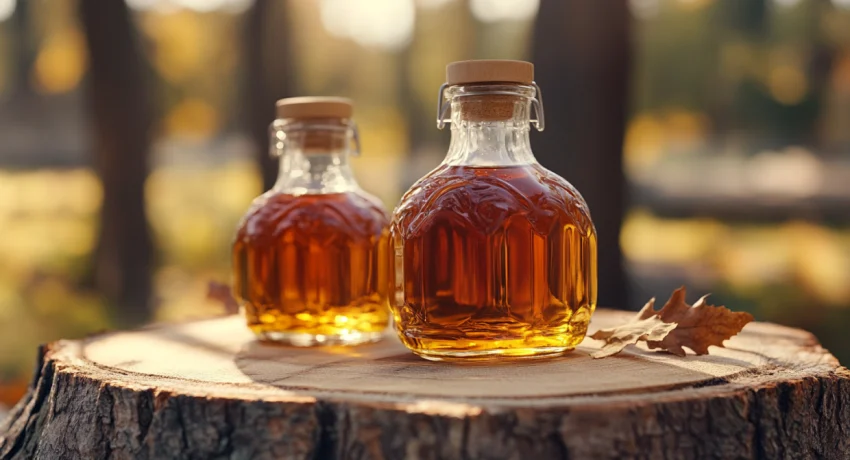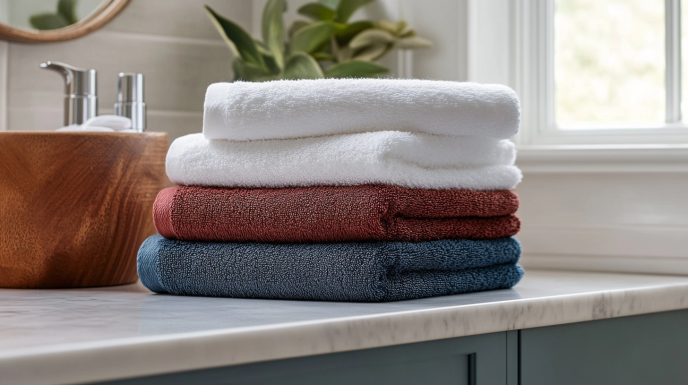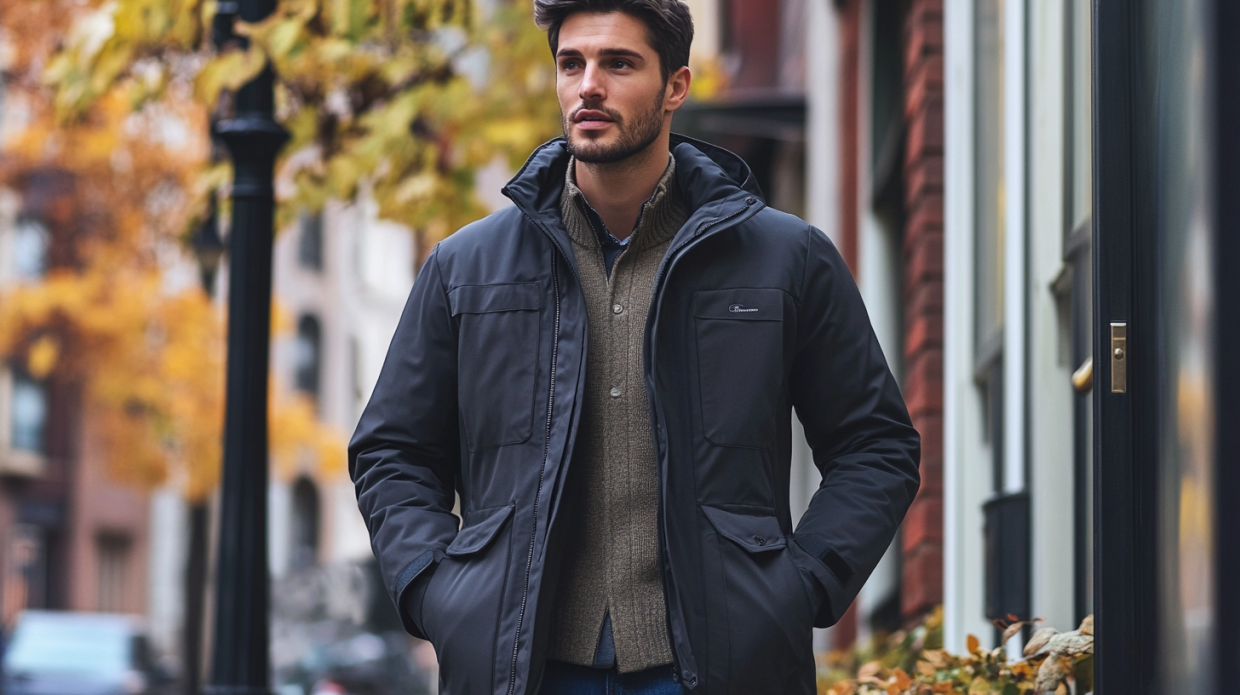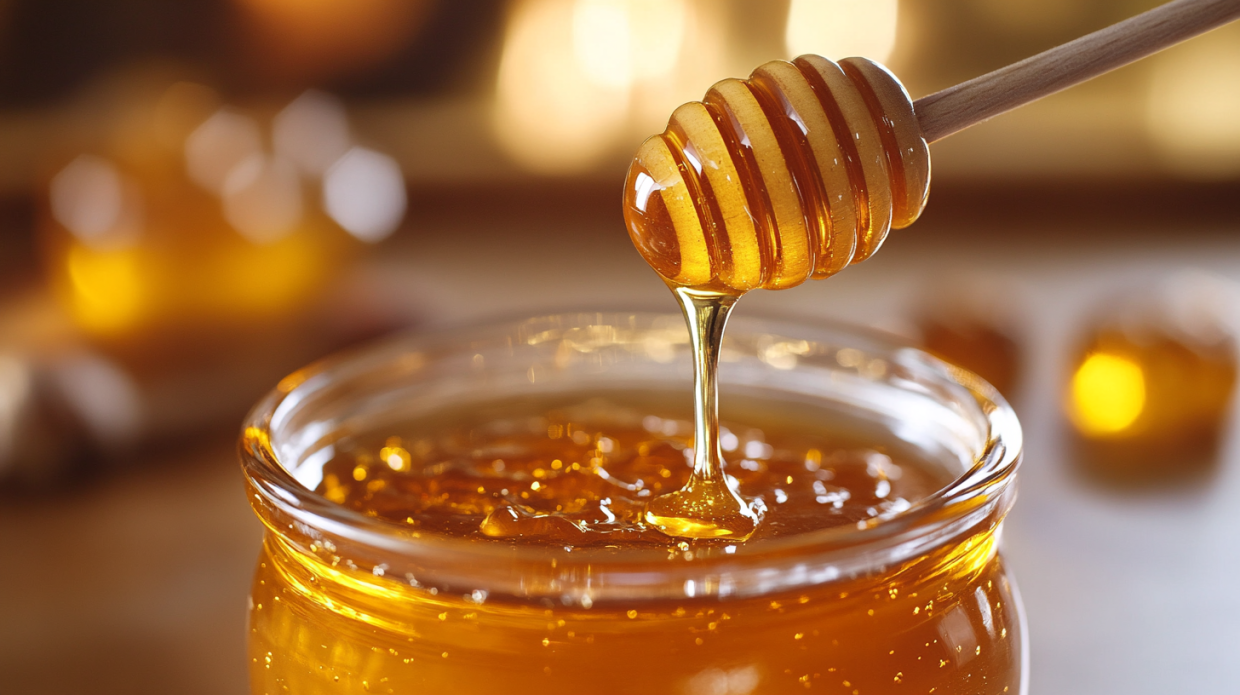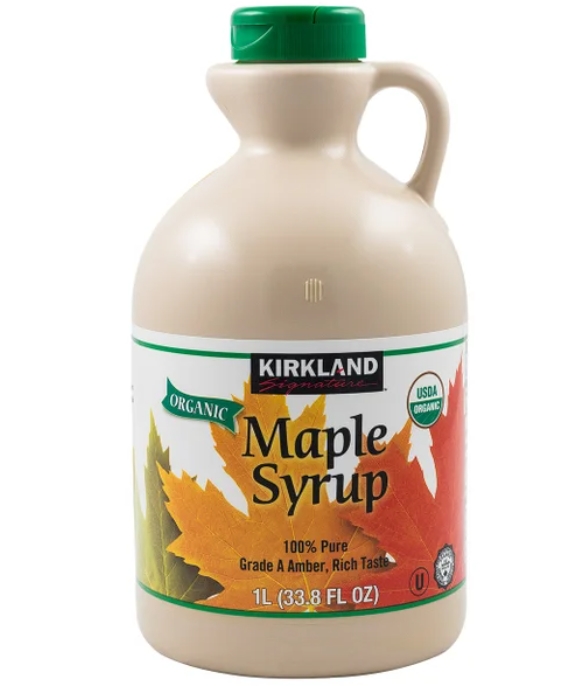
Kirkland Signature Organic Pure Maple Syrup, 33.8 oz
- 100% Pure Grade A Amber Rich
- Kosher
- Flip Cap Plastic Jug
- Gluten Free
- 33.8 fl oz
From Tree to Table: The Complete Guide to Costco’s Sweet Canadian Treasure
In the quiet corners of Canadian forests, a centuries-old tradition unfolds each spring. As winter’s grip loosens and temperatures rise, sap begins its journey upward through the sugar maple trees, carrying with it the promise of one of nature’s most perfect sweeteners. This is where our story begins—not just any maple syrup tale, but one centered around a product that has become a pantry staple for millions: Kirkland Signature Maple Syrup.
As a devoted food enthusiast and maple syrup connoisseur, I’ve spent years exploring the nuances of various syrups, comparing flavors, and investigating production methods. What began as casual curiosity has evolved into a deep appreciation for this amber elixir, particularly Costco’s house brand offering. I’ve found myself returning to the Kirkland bottle time and again, drawn by its consistent quality and remarkable value. But what exactly makes this syrup worthy of such loyalty?
In this comprehensive exploration, we’ll tap into everything you need to know about Kirkland Maple Syrup—from its origins in the forests of Quebec to its journey onto your breakfast table. Whether you’re a maple syrup aficionado or simply wondering if that large bottle at Costco is worth adding to your cart, this guide will provide the sweet answers you seek.
The Grade Debate: Understanding Kirkland’s Maple Syrup Classification
Let’s start with perhaps the most fundamental question for any maple syrup: what grade is it? If you’ve purchased Kirkland Maple Syrup recently, you’ll notice it’s labeled as “Grade A Dark Color, Robust Taste” according to the standardized USDA and Canadian grading systems implemented in 2015.
This classification might confuse those who remember the old grading system, where maple syrups were categorized as Grade A (with Light, Medium, and Dark Amber subcategories) or Grade B (for the darkest, most robust varieties). The current system simplifies things by making all consumer-grade maple syrups “Grade A” with descriptors about color and flavor intensity.
Kirkland Signature Maple Syrup falls into the “Dark Color, Robust Taste” category, making it perfect for those who appreciate a stronger maple flavor that stands up beautifully in cooking and baking while still remaining smooth enough for direct table use.
This particular grade offers a rich, complex flavor profile with caramel notes and a deeper maple intensity than lighter grades. It’s harvested later in the season when the sap contains more minerals and complex sugars, creating that signature robust taste that maple enthusiasts often prefer.
For context, the complete current grading scale includes:
- Grade A Golden Color, Delicate Taste (formerly Light Amber)
- Grade A Amber Color, Rich Taste (formerly Medium Amber)
- Grade A Dark Color, Robust Taste (formerly Dark Amber or Grade B)
- Grade A Very Dark Color, Strong Taste (formerly Commercial Grade)
The transition to this unified system has helped consumers make more informed choices based on flavor preference rather than perceived quality differences between grades.
Pure as the Driven Snow: The Question of Authenticity
In a market flooded with pancake “syrups” that contain little to no actual maple sap, purity becomes a legitimate concern. So, is Kirkland Maple Syrup 100% pure?
The answer is an unequivocal yes. Kirkland Signature Maple Syrup contains only one ingredient: pure maple syrup. This isn’t a maple-flavored concoction or a blend with corn syrup—it’s the genuine article, made exclusively from the concentrated sap of maple trees.
This purity is more than just a selling point; it’s a legal requirement for anything labeled as “maple syrup” in the United States and Canada. The distinction matters tremendously. Those artificially flavored pancake syrups (often prominently featuring the word “maple” on their labels while being mostly corn syrup with caramel coloring) simply cannot compare to the complex flavors of authentic maple syrup.
The difference becomes apparent with the first taste. Where artificial syrups present a one-dimensional sweetness, real maple syrup—including Kirkland’s offering—delivers a layered flavor experience that evolves on your palate, revealing subtle notes of caramel, vanilla, and even hints of smokiness depending on the batch.
The Value Proposition: Cost Analysis of Kirkland Maple Syrup
One of the most compelling aspects of Kirkland Maple Syrup is its price-to-quality ratio. At Costco, you can typically find the 33.8 fl oz (1 liter) bottle for approximately $13.99-$15.99, with regional variations. The exact price fluctuates based on maple syrup harvest yields, which are highly dependent on weather conditions during the brief tapping season.
When compared on a per-ounce basis with other premium pure maple syrups, the value becomes even more apparent:
Kirkland Maple Syrup averages around $0.41-$0.47 per ounce, while competing national brands often range from $0.75-$1.25 per ounce for equivalent quality. This represents a savings of approximately 40-60% without compromising on quality—a classic Costco value proposition.
It’s worth noting that maple syrup prices have generally trended upward in recent years due to climate change affecting production conditions, making the Kirkland option increasingly attractive to budget-conscious consumers who refuse to sacrifice quality.
The Source of Sweetness: Origins of Kirkland Maple Syrup
Like most premium maple syrups available in North America, Kirkland Signature Maple Syrup is sourced from Quebec, Canada—the maple syrup capital of the world. Quebec produces approximately 70% of the world’s maple syrup supply, with its ideal climate conditions and vast sugar maple forests creating perfect conditions for high-quality syrup production.
The Federation of Quebec Maple Syrup Producers (FPAQ) carefully regulates production and maintains the famous “strategic maple syrup reserve”—essentially a maple syrup bank that helps stabilize prices and supply despite seasonal variations in production. This regulated system helps ensure consistent quality and availability.
Costco partners with established Quebec producers who must adhere to strict production standards. While the specific producer isn’t disclosed on the packaging (as is common with many Kirkland products), the Canadian origin is prominently featured, along with confirmation that it’s “produced and packaged in Quebec.”
The Quebec origin is significant because the region’s regulations for maple syrup production are among the world’s most stringent, ensuring authentic, high-quality syrup. The cold winters and warm spring days of Quebec create ideal conditions for superior sap flow and concentration.
Organic Status: Natural but Not Certified
One common question among health-conscious consumers concerns the organic status of Kirkland Maple Syrup. Currently, the standard Kirkland Maple Syrup is not certified organic, though it is a natural product free from additives and preservatives.
What does this mean in practical terms? Maple syrup production is inherently less chemical-intensive than many other agricultural products. The trees aren’t typically sprayed with pesticides, and the syrup-making process is largely mechanical and thermal rather than chemical.
However, to receive organic certification, producers must adhere to additional requirements regarding forest management, cleaning products used in equipment, and processing methods. These certified organic maple syrups do exist on the market (including occasionally at Costco as seasonal special buys), but they typically command a 20-30% price premium.
For many consumers, the natural purity of standard maple syrup, including the Kirkland variety, offers sufficient peace of mind without the additional cost of organic certification. The product remains minimally processed with no artificial ingredients or preservatives.
Nutritional Profile: Understanding What’s in Your Syrup
While maple syrup is undeniably a sugar, its nutritional profile differs significantly from refined sugars. A one-tablespoon (20g) serving of Kirkland Maple Syrup contains:
- Calories: 52
- Total Fat: 0g
- Sodium: 0mg
- Total Carbohydrates: 13g
- Sugars: 13g
- Protein: 0g
Unlike refined sugar, maple syrup contains small but meaningful amounts of minerals, including:
- Manganese: 22% of the Daily Value
- Zinc: 3% of the Daily Value
- Potassium: 2% of the Daily Value
- Calcium: 1% of the Daily Value
It also contains various antioxidants, including over 24 different phenolic compounds. Recent research has found that some of these compounds may have anti-inflammatory properties.
That said, maple syrup remains a high-calorie sweetener that should be consumed in moderation. Its glycemic index of approximately 54 is lower than that of table sugar (65), meaning it causes a less dramatic spike in blood sugar, but it’s still primarily a source of simple carbohydrates.
Dietary Considerations: Gluten-Free and Vegan Status
Good news for those with dietary restrictions: Kirkland Maple Syrup is both gluten-free and vegan. As a single-ingredient product derived solely from tree sap, it naturally contains no gluten proteins and involves no animal products or by-products in its production.
This makes it an excellent sweetener option for those with celiac disease or gluten sensitivity, as well as those following plant-based diets. Unlike honey (which is not vegan) or some processed sweeteners (which may contain obscure animal-derived ingredients), maple syrup is universally recognized as suitable for vegan diets.
It’s worth noting that Kirkland Maple Syrup is produced in dedicated facilities where cross-contamination with common allergens is unlikely, making it a safe choice for many with food sensitivities.
The Competitive Landscape: How Kirkland Compares to Other Brands
In blind taste tests and quality comparisons, Kirkland Maple Syrup consistently performs remarkably well against more expensive premium brands. Its robust flavor profile and smooth consistency have earned it a loyal following.
When compared to other national brands like Vermont’s Finest, Crown Maple, or Canadian brands like Bernard & Sons, Kirkland typically offers comparable quality at a substantially lower price point. The main differences often come down to subtleties in flavor profile rather than overall quality—some brands might have slightly smokier notes or caramel undertones depending on their specific production methods and terroir.
Where Kirkland occasionally falls short is in packaging aesthetics compared to boutique brands that focus on gift-worthy presentation. However, for everyday use, the straightforward, practical bottle design serves its purpose admirably.
What’s particularly notable is that Kirkland has maintained consistent quality despite its scale of production. Unlike some mass-market products that compromise on quality for volume, Kirkland Maple Syrup adheres to the same production standards as premium small-batch producers.
Packaging Practicalities: Size and Container Considerations
Kirkland Maple Syrup comes in a substantial 33.8 fl oz (1 liter) plastic bottle with an easy-pour spout and secure screw cap. This size strikes a balance between economy and practicality—large enough to offer value but not so large that it would expire before a typical household could use it.
The plastic bottle choice has both advantages and drawbacks. On the positive side, it’s lightweight, shatter-resistant, and practical for pouring. The plastic is BPA-free and food-grade. On the downside, some maple syrup purists prefer glass bottles, believing they better preserve flavor over long storage periods.
For context, many artisanal brands offer their syrups in glass bottles ranging from 8-16 oz, often at a price point equal to or greater than the entire liter of Kirkland syrup. The Kirkland packaging prioritizes function and value over premium presentation.
Purity in Processing: Additives and Preservatives
One of the most appealing aspects of Kirkland Maple Syrup is its complete lack of additives and preservatives. The ingredients list contains exactly one item: pure maple syrup.
This purity extends to the production process. Traditional maple syrup making involves collecting sap, concentrating it through evaporation (removing approximately 97% of the water content), filtering to remove impurities, and then bottling. The natural sugars in the concentrated syrup act as their own preservative, eliminating the need for additional chemicals.
The lack of additives contributes to the syrup’s authentic flavor profile and makes it a favorite among those seeking minimally processed foods. While some commercial pancake syrups contain ingredients like sodium benzoate, sorbic acid, artificial flavors, and caramel coloring, Kirkland Maple Syrup remains gloriously uncomplicated.
Culinary Versatility: Beyond the Breakfast Table
While most commonly associated with pancakes and waffles, Kirkland Maple Syrup’s robust flavor profile makes it extraordinarily versatile in the kitchen. Its applications extend far beyond breakfast:
In savory cooking, it excels as:
- A glaze component for salmon, ham, or roasted vegetables
- An ingredient in barbecue sauces and marinades
- A balancing sweetness in vinaigrettes and salad dressings
- A flavor enhancer in baked beans or winter squash dishes
For baking and desserts, it shines in:
- Maple cookies and cakes
- Homemade ice cream bases
- Custards and puddings
- Granola and energy bars
In beverages, it adds complexity to:
- Coffee and tea
- Cocktails (particularly whiskey-based drinks)
- Smoothies
- Homemade kombucha
The Dark Color, Robust Taste profile of Kirkland Maple Syrup makes it particularly well-suited to cooking applications where its flavor needs to stand up to other strong ingredients. In more delicate applications, a lighter hand may be needed, but its depth of flavor generally brings welcome complexity to dishes.
Storage Wisdom: Maximizing Shelf Life
Proper storage is essential to maintain the quality of maple syrup over time. Unopened, Kirkland Maple Syrup has a shelf life of approximately 2-4 years when stored in a cool, dark place.
Once opened, refrigeration is recommended. While the high sugar content provides some natural preservation, refrigeration prevents the potential development of mold, which can occasionally form on the surface of maple syrup stored at room temperature after opening.
When refrigerated, opened maple syrup typically maintains its quality for at least a year. If you notice any mold developing on the surface (which appears as fuzzy white spots), don’t panic—the syrup isn’t ruined. Simply skim off the affected area, bring the syrup to a brief boil, and then return it to a clean container for continued storage.
For those who use maple syrup infrequently, freezing is also an option. Maple syrup’s high sugar content prevents it from freezing solid, maintaining a thick, pourable consistency even at freezer temperatures. Frozen maple syrup can last indefinitely without quality degradation.
The Community Consensus: Reviews and Reputation
Among maple syrup enthusiasts and casual consumers alike, Kirkland Maple Syrup enjoys an overwhelmingly positive reputation. On various consumer review platforms, it typically receives ratings between 4.5-4.8 out of 5 stars.
Recurring praise centers on:
- Exceptional value for the quality
- Consistently robust flavor
- Versatility in cooking applications
- Reliable availability
The few criticisms tend to focus on:
- Occasional preference for glass over plastic packaging
- The larger size being challenging for small households to use before the recommended refrigerated storage time
- Some specialty maple syrup aficionados preferring single-forest or single-producer artisanal options
Among professional food critics and maple syrup experts, Kirkland’s offering is frequently cited as one of the best values in the category, often appearing on “best buy” lists for authentic maple products.
Availability: Where to Find Kirkland Maple Syrup
As a Kirkland Signature product, this maple syrup is primarily available at Costco warehouse locations. It’s a regular stock item rather than a seasonal offering, though supply can occasionally fluctuate based on production variables.
For those without physical access to a Costco warehouse, limited online options exist. The syrup is sometimes available through Costco.com for delivery, though often with minimum purchase requirements or additional delivery fees that may impact the value proposition.
Some third-party resellers offer Kirkland products through online marketplaces, though prices are typically marked up significantly, diminishing the value advantage. For most consumers, purchasing directly from a Costco warehouse remains the most economical option.
Environmental Considerations: Sustainability of Maple Production
While not specifically addressed on Kirkland’s packaging, the sustainability of maple syrup production deserves mention. Maple syrup harvesting, when done properly, is one of the more sustainable sweetener production methods:
- Maple trees are not cut down but rather tapped, allowing them to continue growing and producing sap for decades or even centuries
- Modern collection methods with vacuum tubing systems minimize damage to trees
- Properly managed maple forests support biodiversity and carbon sequestration
- The energy-intensive evaporation process is increasingly utilizing more efficient technologies and renewable fuels
Quebec’s maple industry, where Kirkland sources its syrup, operates under regulations designed to ensure forest health and sustainable production practices. The province’s producers must adhere to quotas and standards that prevent over-tapping and forest degradation.
That said, climate change poses significant challenges to maple syrup production, with shifting temperature patterns affecting sap flow and quality. The traditional sugaring season has become less predictable, with some producers reporting earlier seasons and variable yields.
The Final Pour: Why Kirkland Maple Syrup Deserves a Place in Your Pantry
After this comprehensive exploration of Kirkland Maple Syrup, what emerges is a portrait of a product that exemplifies the Kirkland Signature brand promise: premium quality at a value price point.
The Dark Color, Robust Taste profile offers versatility for both direct use and cooking applications. Its 100% pure composition, free from additives and preservatives, delivers authentic maple flavor without compromise. Sourced from Quebec’s premier maple-producing regions, it meets or exceeds the quality standards of many boutique brands at a fraction of the cost.
For those new to real maple syrup or looking to transition away from artificially flavored pancake syrups, Kirkland offers an accessible entry point into genuine maple appreciation. For experienced maple enthusiasts, it provides a reliable, high-quality option for everyday use, perhaps reserving more expensive artisanal brands for special occasions.
In a world where food authenticity often comes at a premium price, Kirkland Maple Syrup stands as a refreshing counterexample—proof that quality, tradition, and value can sometimes coexist in the same bottle. Whether drizzled over your Sunday pancakes, incorporated into a sophisticated glaze for dinner, or added to your morning oatmeal, this amber elixir delivers a taste of nature’s sweetness that has been cherished for generations.
So the next time you find yourself in the towering aisles of Costco, consider adding this liquid gold to your cart. Your pancakes—and your wallet—will thank you.

